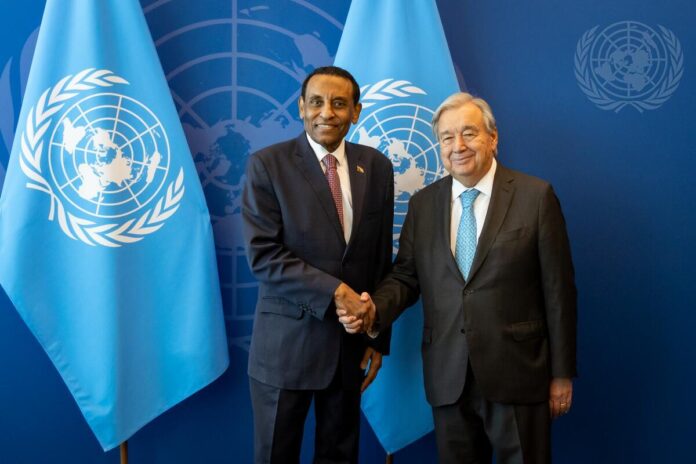Khartoum – United Nations Secretary-General António Guterres reaffirmed the UN’s commitment to supporting Sudan’s state institutions and outright rejection of any attempts to undermine legitimacy or establish parallel governments, stressing the importance of respecting Sudan’s sovereignty and unity.
The two sides, Sudan and the UN, discussed ways to strengthen cooperation, particularly in supporting peace and stability, implementing sustainable development programs, and advancing projects in education, health, security, economic development, and women’s empowerment, as well as enhancing women’s role in peacebuilding.
Guterres praised the resilience and humanitarian values of the Sudanese people. He also called for the immediate lifting of the siege on El-Fasher, the capital of North Darfur State, amid the worsening humanitarian crisis caused by the blockade imposed since May 2024.
In June, Guterres had called for a one-week humanitarian truce in El-Fasher. The government agreed, but the Rapid Support Forces (RSF) and their allies insisted on evacuating civilians from the city, labeling it a military operations zone. According to UN data, around 300,000 civilians remain trapped inside El-Fasher under dire conditions, enduring constant shelling, severe food shortages, and total collapse of basic services including electricity, water, and medical care.
Idris Presents Roadmap to End the War
The Sudanese Prime Minister expressed appreciation for the UN’s vital role in supporting peace and development efforts, reiterating his government’s commitment to achieving a comprehensive and just peace, and to building partnerships based on mutual respect and shared interests.
Idris also presented Sudan’s roadmap to end the war, which includes a ceasefire, the withdrawal of RSF forces from residential areas, lifting the siege on El-Fasher, ensuring the safe return of displaced persons, and guaranteeing humanitarian access. The plan culminates in free and fair elections led by a civilian technocratic government under international supervision and monitoring.
Arab League Supports Peace Initiatives
Prime Minister Idris also met with Arab League Secretary-General Ahmed Aboul Gheit, where discussions focused on how the League can support Sudan across key sectors.
Talks emphasized the urgency of achieving peace in Sudan as a top priority, alongside reconstruction, development, and broader efforts to sustain stability and comprehensive development. Both sides stressed the importance of joint Arab cooperation for a better future for Sudan and reaffirmed the Arab League’s commitment to supporting all initiatives that strengthen peace and development in the country.
Existential Threats to Sudan
In his address to the UN General Assembly, the Sudanese Prime Minister warned of “existential threats” facing the country as a result of what he described as “the crimes of the RSF militia.” He cautioned that the continued siege of El-Fasher and the flow of mercenaries and weapons to the militias represents a blatant violation of international law and the UN Charter.
Idris underscored the need for coordinated African efforts to safeguard state sovereignty and prevent external interference, calling for African solutions to African crises.
He criticized the persistence of unilateral sanctions on some countries, arguing they hinder development and threaten human rights. Idris voiced concern over the politicization of human rights, warning against using the issue as a tool of political pressure, and instead urged a comprehensive approach that considers social and economic dimensions.
The Prime Minister reaffirmed Sudan’s adherence to international humanitarian law, noting that his government had submitted to the Security Council a national plan to protect civilians. The plan includes domestic mechanisms to safeguard communities, facilitate humanitarian aid delivery, curb the proliferation of weapons, and combat gender-based violence.
He condemned the international community’s silence on what he called “the crimes of the terrorist rebel militia,” which include shelling IDP camps, houses of worship, and schools, looting markets, and destroying health facilities. He warned that silence in the face of such abuses amounts to tacit encouragement of their continuation.
“No Impositions Against Our Sovereignty”
Idris emphasized that Sudan’s civilian “Government of Hope” remains open to cooperation with the international community, but firmly stated that the country “will not accept any impositions that undermine its sovereignty and national security.” He pledged to safeguard the dignity of the Sudanese people and work toward a just and lasting peace.
Meanwhile, Sudan’s Minister of Foreign Affairs and International Cooperation, Ambassador Mohiuddin Salem, participated in the annual meeting of the Least Developed Countries (LDC) group, held on the sidelines of the 80th UN General Assembly session.
In his remarks, the minister outlined the challenges Sudan faces as a result of the war launched by the “rebel RSF militia” since April 15, 2023. He stressed that the conflict has created the world’s largest internal displacement crisis, uprooting more than 11 million Sudanese citizens and causing massive destruction to infrastructure.
The minister appealed to the international community for coordinated financial and technical support for reconstruction, debt relief, concessional financing, investment in agriculture, renewable energy, and digital infrastructure, as well as strengthening social safety nets, particularly for the most vulnerable groups, especially women and children.


